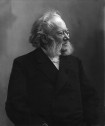Henrik Ibsen

Henrik Johan Ibsen (Norwegian: [ˈhɛnɾɪk ˈɪpsən]; 20 March 1828 – 23 May 1906) was a major 19th-century Norwegian playwright, theatre director, and poet. He is often referred to as "the father of realism" and is one of the founders of Modernism in theatre. His major works include Brand, Peer Gynt, An Enemy of the People, Emperor and Galilean, A Doll's House, Hedda Gabler, Ghosts, The Wild Duck, Rosmersholm, and The Master Builder. He is the most frequently performed dramatist in the world after Shakespeare, and A Doll's House became the world's most performed play by the early 20th century. Several of his later dramas were considered scandalous to many of his era, when European theatre was expected to model strict morals of family life and propriety. Ibsen's later work examined the realities that lay behind many façades, revealing much that was disquieting to many contemporaries. It utilized a critical eye and free inquiry into the conditions of life and issues of morality. The poetic and cinematic early play Peer Gynt, however, has strong surreal elements. Ibsen is often ranked as one of the truly great playwrights in the European tradition. Richard Hornby describes him as "a profound poetic dramatist—the best since Shakespeare".[7] He is widely regarded as the most important playwright since Shakespeare. He influenced other playwrights and novelists such as George Bernard Shaw, Oscar Wilde, Arthur Miller, James Joyce, Eugene O'Neill and Miroslav Krleža. Ibsen wrote his plays in Danish (the common written language of Denmark and Norway) and they were published by the Danish publisher Gyldendal. Although most of his plays are set in Norway—often in places reminiscent of Skien, the port town where he grew up—Ibsen lived for 27 years in Italy and Germany, and rarely visited Norway during his most productive years. Born into a merchant family connected to the patriciate of Skien, his dramas were shaped by his family background. He was the father of Prime Minister Sigurd Ibsen. Ibsen's dramas continue in their influence upon contemporary culture and film with notable film productions including A Doll's House featuring Jane Fonda and A Master Builder featuring Wallace Shawn.
 čeština
čeština Deutsch
Deutsch français
français magyar
magyar polski
polski русский
русский English
English Azərbaycan
Azərbaycan italiano
italiano ქართული
ქართული қазақ
қазақ Nederlands
Nederlands português
português slovenčina
slovenčina español
español 中文
中文 беларуская
беларуская








